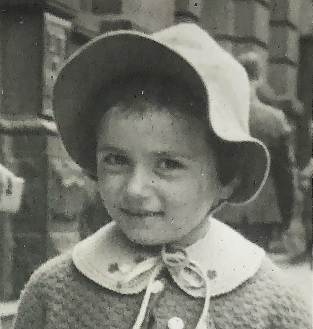
Lisa Kraft was born Elisabeta Ernestina Renata Rosenthal on April 24, 1938 in Trieste, Italy. Her father, Nandor Rosenthal, worked at a Hungarian-Jewish owned asbestos company. The company closed due to rising antisemitism in 1937, and the family opened a coffee house. Lisa’s mother, Trude Pollak Rosenthal was born in Austria. Trude baked and made gelato for the café, while taking care of her daughters, Lisa and Eva, who was a year older than Lisa. Lisa and her family often saw Trude’s sister Gretl and Gretl’s three children who lived nearby. Lisa’s paternal grandparents lived in Miskolc, Hungary, where Nandor was born. They sent dolls to Lisa and Eva and wrote to Lisa’s parents about the plight of the Jewish community in Miskolc.
In 1938, the Italian fascist regime passed antisemitic legislation, placing restrictions on the Jewish community and excluding Jews from participating in many aspects of daily life. The Rosenthal family, like thousands of Italian Jews, made preparations to emigrate. Since Lisa’s parents were immigrants, this process was especially challenging. For over a year Lisa’s parents worked to secure a permit to leave the country. Hoping to explore potential mining, New Zealand’s government granted the Rosenthals a permit due to Nandor’s expertise in asbestos.
Lisa and her family left for New Zealand in June, 1939, aboard the SS Orontes, one month after Italy and Germany signed the “Pact of Steel,” formalizing their alliance. Lisa spent much of her time on the ship’s decks with her aunt Erzibet, Nandor’s sister. Eva became critically ill, so when the ship docked in Australia, the family remained in Sydney for three months while she recovered in a local hospital. The Rosenthals arrived in Wellington, New Zealand on August 30th. They received some assistance from the local Jewish community and lived in a small apartment behind the synagogue, with other Jewish refugees, before moving into a house of their own. Lisa spoke German at home and eventually attended school, learned English, and joined Habonim, a Zionist youth organization. Her brother Ernest was born in 1944. Although their new community was welcoming, the Rosenthals faced antisemitic taunts at work and school—often due to their difficulties learning English.
During the war, Lisa and her family lost all communication with relatives in Europe. To follow the Allies’ progress, she listened to the radio with her parents, and on V-E Day in 1945, Lisa accompanied her father downtown to celebrate the allied victory. A New Zealand soldier serving in Italy met Lisa’s cousin in Florence during liberation. Through letters from the soldier, Lisa and her family learned that her Aunt Gretl and her cousins survived hiding in Florence with false papers. The rest of Lisa’s family were deported from Miskolc in March 1944 and killed in Auschwitz and Stutthoff.
In 1962, Lisa traveled to England where she met Michael Kraft, an American journalist. They were married 1965 and moved to the United States in 1968, settling in the Washington, DC area. They have two children. After a career in teaching, Lisa volunteers at the United States Holocaust Memorial Museum.
